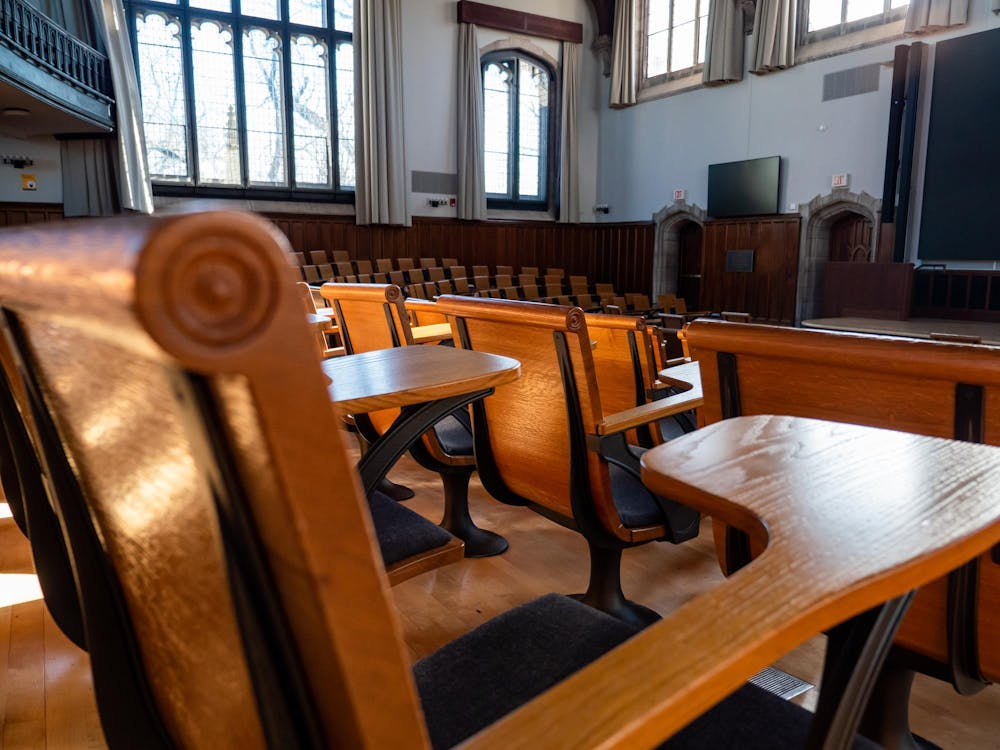The University witnessed something unprecedented this week, something that should make it pause in concern. This spring was meant to be a season of celebration among graduate students, as the University embarked on its commemoration of the centennial of the graduate school.
With the celebration of the centennial, graduate students who may have felt under-appreciated and under-served in the past would finally begin to reaffirm their loyalty to the University. Happy graduate students would make for a stronger institution — Princeton would continue to attract the most qualified candidates, which would enable the University to retain its top-notch faculty. Finally, happy graduate alumni would give back to the University by contributing money and by serving as future presidents and vice presidents of this institution.
Unfortunately, the University is squandering a golden opportunity to reach out to graduate students. Instead of winning their loyalty, the administration has done nothing but provoke student anger and frustration. Graduate student anger has expressed itself in many ways — a barrage of e-mails to Dean of the Graduate School John Wilson and Associate Dean F. Joy Montero, several letters sent to the 'Prince' and acts of civil disobedience such as the strike by employees of the D-Bar. The level of student anger and mobilization is remarkable, not only in its intensity, but also its scope. Students who have never before considered themselves political or activist are writing letters expressing their profound disappointment with the institution. Perhaps most disturbing, students have begun to openly express their reluctance to recommend graduate student life at Princeton to prospective graduate students.
What has prompted graduate students to take such a public stance against the University? The most obvious and immediate cause of student anger is the administration's decision to restrict graduate student access to the D-Bar. Viewed by most graduate students as an affordable and central venue for social gatherings and parties, the D-Bar is suddenly no longer accessible to the majority of graduate students. Shutting down the D-Bar to non-Graduate College residents is akin to closing off the 'Street' to freshmen and sophomores. The administration would not even contemplate making such a move to combat the problem of underage drinking. But it had no problem restricting the behavior of responsible adults who are entrusted to lead precepts and grade exams. Indeed, it saw no problem in running roughshod over a Graduate College referendum to extend membership benefits to all graduate students.
Student anger erupted over the D-Bar issue, both for its substantive implications and the process by which the decision was made. Substantively, the policy discriminates among students whom the University already treats as second-class citizens. Equally disturbing is the unilateral manner in which the decision was made. Despite the fervent appeals of graduate students and their leaders, the administration refused to change its discriminatory position. Furthermore, it did not even attempt to consult the opinions of the majority of graduate students who would be affected by the decision. Finally, after making a unilateral decision that was not supported by any graduate student organization, the administration had the gall to send out a campus-wide e-mail that misrepresented the facts and made a scapegoat of the House Committee — a representative body of the Graduate College.
The callousness with which the University regards graduate students has also been evident in the decisions regarding the future of this University. The Wythes committee did not have a single graduate student representative, and the only alumnus representation was that of President Shapiro. Furthermore, the committee did not even consider that it may want to strengthen the graduate school while attempting to strengthen the undergraduate body. The University has not guaranteed that graduate students will not see an increase in their teaching responsibilities. Finally, some University officials continue to insist that the Graduate College should be converted into an undergraduate dormitory. This, despite the fact that the Graduate College is a treasured residential and social space with full occupancy, and despite the fact that student leaders have continually expressed their opposition to such a move.
As the University prepares to celebrate the centennial of the graduate school, it should take immediate steps to stop actions that make graduate students feel unwelcome here. And it should take proactive measures such as granting full health benefits, giving more money to graduate student organizations and developing post-enrollment support institutions.
The D-Bar issue, while seemingly farcical, may indeed be a turning point in the life of this University. The direction that this University takes is fully in the hands of the administration. Hopefully, it will mean that Princeton will take positive steps to restore the confidence and trust of its graduate students and alumni. Without concrete, positive moves, the University stands to lose out on its top-notch graduate school. And without a top graduate school — to paraphrase a high-ranking University official — Princeton would make an excellent Swarthmore. S. Karthick Ramakrishnan is a politics and Office of Population Research graduate student from Holden, Mass. He can be reached at karthick@princeton.edu.







